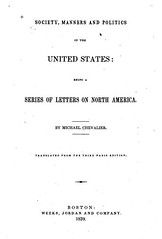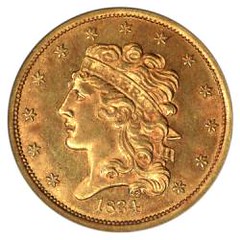
PREV ARTICLE
NEXT ARTICLE
FULL ISSUE
PREV FULL ISSUE
CHEVALIER'S COMMENTS ON U.S. GOLD COIN USAGE
Dave Ginsburg submitted this item on the use (or lack thereof) of gold coins in circulation in the U.S. in the early 1800s. -Editor
M. Chevalier, like his more famous countryman, Alexis de Tocqueville, seems to have had the idea: “Well, if I’m going there anyway, I might as well write a book about my experiences.” His book, “Society, Manners and Politics in the United States” takes the form of a series of letters and was sufficiently popular that it went through three editions in French and appeared in English in 1839. M. Chevalier provides lively comments and observations on the construction of railroads, the financial and banking environment, the state of politics and a number of other things. Fortunately for numismatists, he also noticed and commented on the money situation in America. In one of his first letters from the United States, dated January 5, 1834, he says: “Since I have been in the United States, I have not seen a piece of gold except in the mint. No sooner is it struck off, than the gold is exported to Europe and melted down.” (page 63) I think he perfectly captures the situation that had existed since American gold coins were first produced in the early 1790s: the US coinage laws undervalued gold in terms of silver, so gold was exported to Europe to pay for imported goods and almost never seen in circulation in America.
As suggested by the decades of political arguments, the subject of money was a potent political football: President Jackson, in particular, was opposed to banks (especially the Bank of the United States) and banknotes and in favor of circulating gold coins. In a letter dated August 24, 1834, M. Chevalier writes: “Gold is called Jackson money; the United States mint has been actively employed in striking gold coins, half-eagles and quarter-eagles. The principal journals of the Jackson party pay the daily wages of their journeymen printers in gold; the warm friends of the Administration affect to carry gold pieces in their pockets, and as paper [money] only is generally used here in business transactions, even of the most trifling amount, you may be certain that a man who is seen with gold in his hands, is a Jacksonman. The President lately made a visit to his seat in Tennessee, and paid his expenses all along the road in gold, and the Globe, his official organ, took care to inform the public of it. At a dinner, given in honour [sic] of him by the citizens of Nashville, he proposed this toast: “Gold and silver, the only currency recognised [sic] by the constitution!” (page 147) For those of us who study numismatic history, we know that it’s not just about the mint facilities, or the supply of gold and silver, it’s also about politics – and pretty much always has been. M. Chevalier also provides additional confirmation that the wheels of commerce in the United States were powered by paper (currency and promissory notes) - then as now. Fortunately for us, we need not seek out an original copy of the book or even one of the many reprints, as the book is available through the magic of Google Books. To read the book, go to:
Wayne Homren, Editor The Numismatic Bibliomania Society is a non-profit organization promoting numismatic literature. See our web site at coinbooks.org. To submit items for publication in The E-Sylum, write to the Editor at this address: whomren@gmail.com To subscribe go to: https://my.binhost.com/lists/listinfo/esylum All Rights Reserved. NBS Home Page Contact the NBS webmaster 
|

